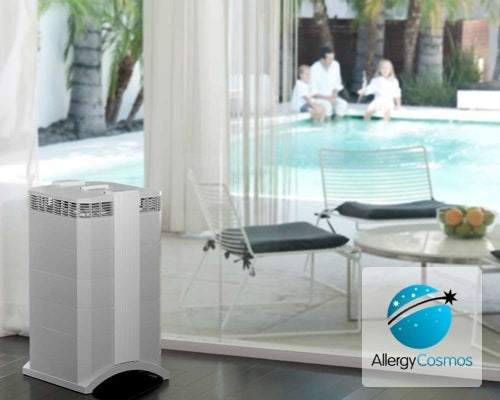What are the effects of allergic rhinitis? Rhinitis is the inflammation of the nasal passages which may be caused by allergy, although there are also other causes. There are two kinds of allergic rhinitis – seasonal (also known as hay fever) and perennial. In perennial rhinitis, allergy symptoms occur all year round (though some people do find their rhinitis to be worse in the summer). With perennial allergic rhinitis, it could be that you are sensitive to an allergen like house dust mite or animal dander which is present year-round, unlike pollen, which is seasonal. A tell-tale sign is if your rhinitis symptoms become worse when you are doing housework like dusting or changing the bed, or in contact with animals.
The symptoms of perennial allergic rhinitis include:
- Blocked nose (you may notice that sometimes one side of the nose is more blocked than the other – this arises because of the way we breathe naturally, which is by switching from one nostril to the other, rather than breathing evenly through both)
- A runny nose
- Itchy nose
- Sneezing
- Sore eyes
- A headache
- A morning cough
Rhinitis may extend to the sinuses, which are the spaces in the skull between the eyes, behind the cheekbones, the nose, and forehead. In this case, it is known as rhinosinusitis and symptoms will also include facial pain and some loss of the sense of smell.
Although allergic rhinitis is not medically serious, it does have a significant impact on your quality of life. Research studies on how rhinitis affects people from day to day generally do not distinguish between seasonal and perennial allergic rhinitis, so we have to assume these are similar for both conditions. Results from the SF-36 health survey showed that over one-third of patients with allergic rhinitis have reduced quality of life, poor self-esteem, emotional problems, fatigue and reduced sexual functioning.
The impact of allergic rhinitis on sleep has been documented. Nasal congestion seems to be at its worst in the early hours of the morning and when lying down, so no wonder many patients complain about disturbed sleep. Snoring is common too, with allergic rhinitis, and this can disturb partners sleeping with the patient. Meanwhile, children with allergic rhinitis have been shown to suffer from irregular breathing, snoring, and even obstructive sleep apnea.
Not surprisingly, the fatigue resulting from a lack of sleep affects work and school performance. While people with allergic rhinitis tend not to take much time off work, when they are there, productivity tends to be affected by the presence of symptoms like a blocked nose, fatigue and lack of concentration. It is estimated that lost productivity in this situation ranges from 11 to 40 per cent.
Allergic rhinitis is particularly common among teenagers and one milestone study from Samantha Walker (Warwick, UK) and her team shows that children with hay fever are more likely to drop a grade between their mock GCSEs and their summer exams than those who do not have hay fever. The effect was particularly marked among children taking sedating antihistamines. There is no reason to think that this finding would not also apply year-round in the context of study and learning to children who suffer from perennial allergic rhinitis.
Therefore, the psychological and social impact of perennial allergic rhinitis is as important as the physical side. The doctor can assess what impact rhinitis is having on the patient's quality of life by using the Rhinoconjunctivitis Quality of Life Questionnaire (with its adolescent and pediatric versions, as appropriate). Treatment and advice should be tailored according to the quality of life, impact of a blocked nose and other symptoms. Tests may reveal which allergen is involved and appropriate avoidance measures are key to managing the symptoms – such as regular damp dusting and maybe use of an air purifier for house dust mite allergen. Nasal steroid sprays are the most effective treatment for perennial allergic rhinitis. Antihistamines also have a role to play but are sure to go for the newer generation non-sedating ones, rather than the older ones which have a sedating effect that can make your concentration worse. It may be tempting to go for a nasal decongestant as a 'quick fix' for blocked nose symptoms, but these should only be used for a limited time, as they can cause 'rebound' congestion and actually make your symptoms worse. If in doubt, speak to your pharmacist who will be able to advise on the various medications available for perennial allergic rhinitis.
But the first choice should always be to limit your day to day exposure to allergens, and the best way to do that is through the use of a high-performance allergy air purifier.
References. Walker S et al (2007). Seasonal allergic rhinitis is associated with a detrimental effect on examination performance in United Kingdom teenagers: a case-control study. Journal of Allergy and Clinical Immunology 120(2); 381-387
Vandenplas O et al (2008). Rhinitis and its impact on work. Current Opinion in Allergy and Clinical Immunology 8(2); 145-149
Melzer EO (2001). Quality of life in adults and children with allergic rhinitis. Journal of Allergy and Clinical Immunology. 108; S45-53




